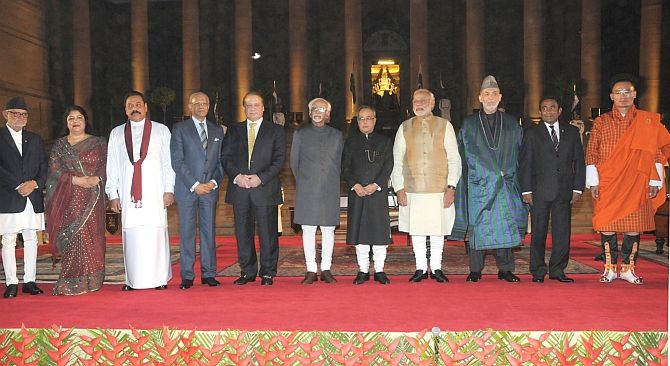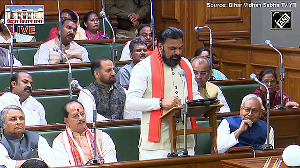'India should think big: About how in a multi-polar world, India can indeed be one of the poles, rather than being a secondary power that has to worry about 'alignment' with one of the poles. A G3 in other words, India should look to getting others to align with itself rather than the US or China,' says Rajeev Srinivasan.
 There is such a thing as timing and luck. If I were an optimist, I would suggest that the time is ripe as never before for India: this could be India's time in the sun, as the Indo-Pacific Century brings to an end the Atlantic Century.
There is such a thing as timing and luck. If I were an optimist, I would suggest that the time is ripe as never before for India: this could be India's time in the sun, as the Indo-Pacific Century brings to an end the Atlantic Century.
India should think big: About how in a multi-polar world, India can indeed be one of the poles, rather than being a secondary power that has to worry about 'alignment' with one of the poles. A G3 in other words, India should look to getting others to align with itself rather than the US or China.
Prime Minister Narendra Modi's epic victory in the Indian elections comes at the cusp of several events that demonstrate how far the world has changed in a short time. Many both on the Left and the Right find it hard to deal with the momentous changes that have come with Modi's ascent. That's certainly true in India.
As far as the world at large is concerned, things have changed dramatically in 2014 and even on the very day of Modi's swearing-in. I was startled to read that US President Barack Obama had made a secret visit to Afghanistan to celebrate America's Memorial Day with the troops.
Upon arrival, Obama requested, at short notice, a meeting with Afghan President Hamid Karzai at the Bagram Air Force Base. Surprisingly, Karzai refused. Instead, he got on a plane and landed in New Delhi to attend the Modi inauguration ceremony.
Granted, there has been plenty of bad blood between the US and Karzai, and he is anyway about to leave the Afghan presidency. But consider: The leader of the occupying force in his country, not to mention the leader of the so-called Free World, wanted to meet him, but Karzai snubbed him to meet Modi, till just the other day deemed untouchable, whose US visa was denied as a punishment for him!
To use an old American idiom, 'You've come a long way, baby!' That is true of Modi personally, but it also indicates how India now has the chance to be a somebody. Echoing Marlon Brando's words as a burnt-out boxer in On the Waterfront, India 'coulda been a somebody, coulda been a contender', but instead 'We are bums'. Fifty wasted years!
There is a larger context that has unfolded over the last few years. First, there is widespread belief that the US has lost interest and capability in overseas adventures. Second, the spectacle of China's allegedly 'peaceful' rise, which has turned distinctly muscular recently. Third, the rise of anti-pacifist sentiment in Japan. Fourth, the increasing assertiveness of Russia. Of course, all of these are related.
In addition, the recent European Union election has been notable largely for the success of ultra-nationalist, anti-Euro/anti-EU parties in France, Germany, Britain, Greece, Italy, etc. It appears that the dream of a united single market in Europe is receding; anyway with the demographic implosion in much of prosperous Europe, it is getting to be less and less relevant.
The malaise that afflicts the US is due partly to one of those periodic funks that encourage the nation to look inward ('Fortress America'), especially after it has wasted much blood and treasure in interminable, unwinnable wars in Iraq and Afghanistan. It is partly due to the lingering effects of the financial meltdown, and the realisation that the US simply cannot afford large-scale, long-drawn-out wars.
It is also partly a function of the fact that despite all the hoopla that greeted his win in the elections, President Obama is now seen as a bit of a failure. In general, his efforts have been treated with scorn: his 'Pivot to Asia' has not prevented the Chinese from rattling sabres all around the region; his dire warnings did nothing to prevent Russia's Vladimir Putin from capturing Crimea; and his Lakshman Rekha to Syria over chemical weapons was breached.
That short period in which Francis Fukuyama trumpeted 'The End of History' and the US was the only hyperpower is coming to an end, principally due to imperial over-reach, as the British found out a century ago. Even giant America, with its continental size and exuberant population, can only be primus inter pares, first among equals, not hegemon. In particular, the instincts of Obama, not exactly an electrifying leader, lead towards passivity.
China is beginning to lose a bit of its lustre: Among other things, there is the fear of an economic downturn there, challenging the justification for the continued totalitarian rule of the Communist Party there. Furthermore, on the 25th anniversary of the Tiananmen Square protest, the enforced peace is broken by regular massacres and suicide bombings supposedly by separatist Uighurs: they cannot take internal docility for granted.
The exertions of their navy in the South China Sea, their imposition of their air defence zone in the East China Sea, the deliberate provocation of Vietnam by drilling for oil in their territorial waters: All these point to the fact that China's alleged 'peaceful rise' is just a myth. In response, its neighbours are getting much more wary of China.
Furthermore, despite their willingness to consort with dubious leaders in Africa, their neo-imperialism is beginning to annoy the people there (as it did in Myanmar). China is no longer seen as positively as it was earlier.
Japan, irritated by Chinese adventurism, and fearful that American defence commitments are not worth very much, is on a path that will amend the infamous Article 9 in its constitution that essentially forces it to be a pacifist nation, unable by law to have normal armed forces.
Nationalist Japanese, of whom Prime Minister Shinzo Abe is one, are also tired of the ongoing propaganda that has deemed the Japanese to be major villains, besides their having atoned for their wartime sins many times over. They have apologised, they have given reparations, yet they are berated for, in essence, being gullible enough to take Western media seriously.
Besides, the Japanese are looking to de-invest in China, given that the two countries may well be on the verge of a war. These factors, as well as a civilisational/cultural amity, mean that an Indo-Japanese partnership could become a major factor in Asia. A 'reverse string-of-pearls' containing China in its continental heartland is a possibility if India, Japan, Russia, Vietnam, Australia, the US come together to form a loose alliance.
Finally, there is a (somewhat) resurgent Russia. In some ways Obama is pushing Russia into China's arms through sanctions: The recent signing of a giant $400 billion, multi-year gas deal is an example of this, and the Chinese got it at a bargain price. There are simmering tensions between them, for instance based on the influx of Chinese into sparsely-populated Russian Siberia. But a workable detente has been created by the two.
The Financial Times wrote about how 'Modi completes a quartet of combative leaders in the most powerful nations of the region (Asia) (The Perils of Asia's nationalist power game, FT, May 22). The quartet is: Vladmir Putin of Russia, Modi, Xi Jinping of China, and Abe. The fact is that they will increasingly demand respect and attention, and that America will slowly become less influential in Asia.
The key to India's possible future importance lies in a few factors: Demography, location, and, now, decisive leadership. The demographic dividend needs no elaboration. The fact that India sits right smack in the middle of the most dynamic area in the world, the Indian Ocean Rim, with rapidly developing South-east Asia on the one side, and the future growth paragons of Africa on the other, is big geopolitical plus. As geostrategist Nicholas Spykman suggests, it is the Rimland that is becoming more important than the Heartland of Asia.
What India has lacked for a long time is leadership and focus. Modi supplies both these, as well as discipline, in ample measure. As Martin Wolf of the Financial Times pointed out, ('India's election remakes our world', FT, May 20), 'This may be the most momentous election in history, bar the elections of Abraham Lincoln and Franklin Delano Roosevelt' (okay, he betrays his Anglo-American bias, but still).
It will be in economics and commerce that a rising India can make the biggest impact. The industrial revolution a few centuries ago (in Europe), and the manufacturing revolution a few years ago (in Asia) bypassed India because of bad luck, poor education and infrastructure. But this time, with Modi at the helm, India may well become a new manufacturing hub.
In a way, the self-inflicted troubles of Thailand and the attacks on Chinese factories in Vietnam are to India's benefit: India will be seen as a more dependable logistics hub (if only we could get the roads, ports and electricity in place).
Given India's vast resources (human and physical), there is no reason why we cannot have big Indian multinationals bestriding the world. The Economist magazine ran a recent story on how rising Asian companies may need to do a few things differently from American and European MNCs before them. This is true: It does not do to copy business models, because they have to be based on national core competencies: for instance, as Germany has done with its mittelstand, or Japan with its keiretsu.
This means India will have to invent its own -- although I hate to use this term because of prior associations -- Third Way. It will have to create a Capitalism with Indian characteristics, one that recognises the long-term value, for instance, of agriculture. This will also require a Third Way of diplomacy, as almost all nations follow mercantilism to a greater or lesser extent.
In a recent post, Cleo Paskal asks: 'Will Modi's India Reinvent International Relations?' (Huffington Post, May 30). It can, and it should. There is the Cold War paradigm of two warring factions: The idea of G2 is a force-fit of that scenario into the rise of China.
With the likely rise of Modi's India, we need to plan for a multi-polar world.
It may be a G5 or G6 or something, but India should aspire to be one of the poles for sure.
Image: Nepal Prime Minister Sushil Koirala, Bangladesh Speaker Shirin Sharmin Chaudhury, Sri Lanka President Mahinda Rajapaksa, Mauritius President Navin Ramgoolam, Pakistan Prime Minister Nawaz Sharif, Vice-President Hamid Ansari, President Pranab Mukherjee, Prime Minister Narendra Modi, Afghanistan President Hamid Karzai, Maldives President Yameen Abdul Gayoom and Bhutan Prime Minister Tshering Tobgay pose for a photograph soon after the NDA government was sworn-in on May 26, 2014. Photograph: Press Information Bureau.
Rajeev Srinivasan is a management consultant and business school professor. His earlier columns can be found here.











 © 2025
© 2025